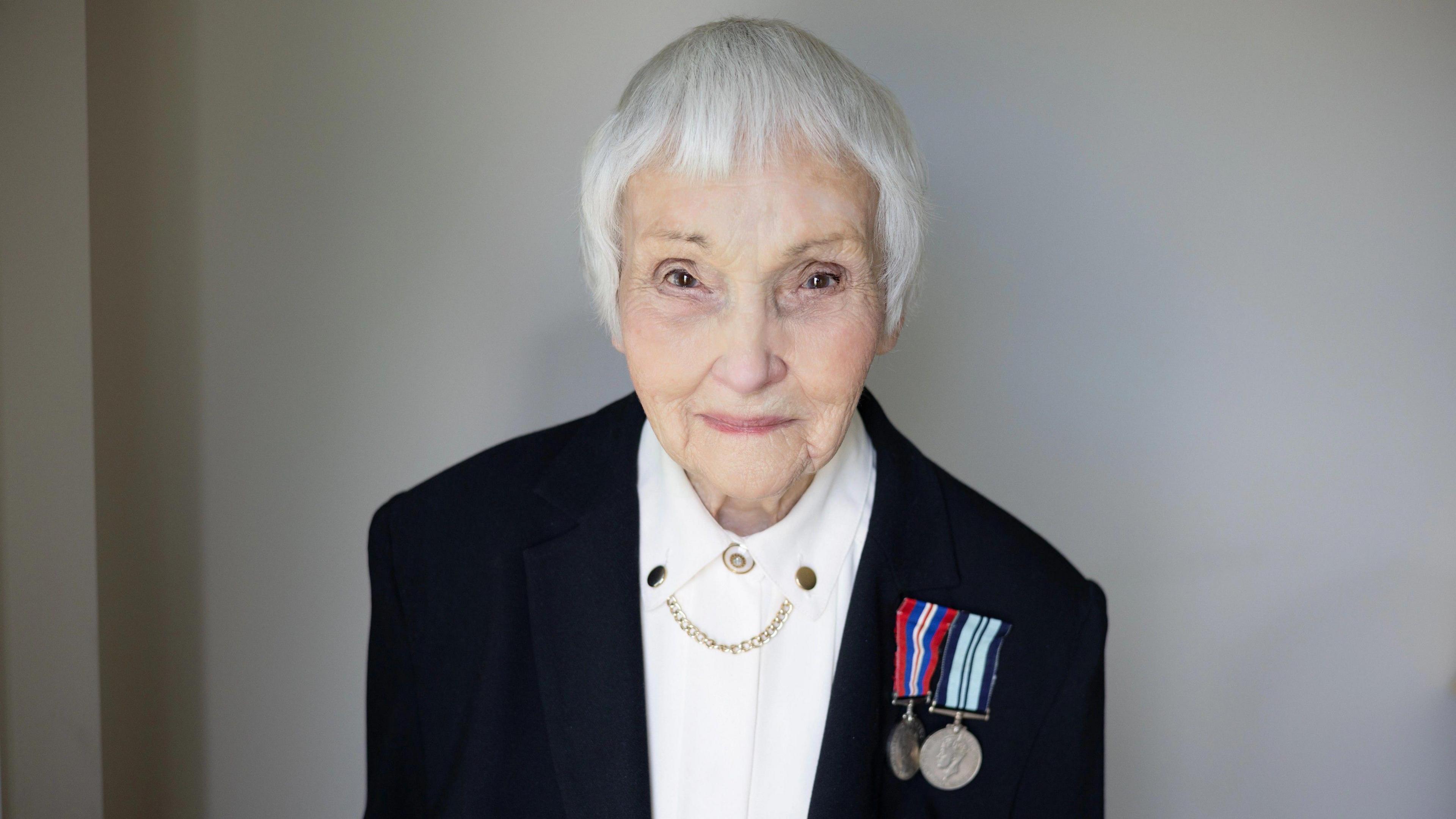WW2 veteran 'heartbroken' after meeting minister

- Published
A World War Two veteran has said she is "angry" and "heartbroken" after a meeting with a minister left her believing the government will not consider changing its policy of freezing the state pensions of some British citizens who live overseas.
Anne Puckridge, who turns 100 this month, had travelled from her home in Canada to lobby the government.
She is one of just over 453,000 British pensioners living abroad who do not get any annual rise in their state pension.
Pensions Minister Emma Reynolds agreed to a meeting after a request to see Sir Keir Starmer was turned down due to "pressures on his diary".
Following the meeting in Parliament, Ms Puckridge said she had been left feeling "bitterly disappointed" and "disgusted".
She said she had got the impression Reynolds had been "polite enough and kind enough to come in and spend her time with us but I think her mind was made up before we even started the meeting".
Ms Puckridge said she and her fellow campaigners would have to think "very carefully about what we really can do from now" although she added they would do something.
Ms Reynolds said she thanked Ms Puckridge for the meeting and for sharing her experiences.
A spokesperson for the Department for Work and Pensions (DWP) said the government understood that "people move abroad for many reasons, and we provide clear information on how this can impact their finances in retirement – with the policy on the uprating of the UK state pension for recipients living overseas a longstanding one".
The spokesperson said the government was "deeply proud of our veterans and their families for the contribution they make to our country".
Previous governments have rejected calls to uprate frozen pensions, citing the cost as a barrier.
A source with knowledge of a previous government's approach suggested that unfreezing the pensions would not be as simple as it might appear and risked opening the door to legal challenges.
Ms Puckridge has received £72.50 a week since she moved to Canada in 2001, at the age of 76, to be nearer her daughter.
Her state pension is now less than half the £169.50 paid to pensioners still living in the UK.
She told the BBC frozen pensions affect every aspect of life.
"You’ve got to be careful about entertainment," she said.
"You’ve got to remember you can’t be as kind to your grandchildren as you’d like to be.
"You feel you’ve lost all sense of dignity, the government has thrown you away, you know, out of sight out of mind."
Ms Puckridge said when she informed the DWP she was moving to Canada "they never said a word about [my] pension being frozen".
"The first I knew about it was when my first raise was due," she said.
"I didn’t get it. So I wrote and asked about it, and I was told no... you will receive no more from the day you left the UK, no more increases in pension."
She added: "It’s the injustice of it that is so unfair, the fact that we were never warned."

Ms Puckridge (second from left) enlisted to serve during World War Two at the age of 17
Under an arrangement called the triple lock, the UK state pension goes up each year by either 2.5%, inflation or earnings growth - whichever is the highest figure.
Not all pensioners who move abroad have their pensions frozen.
The UK has agreements in place with EU countries and the United States, among others, to continue increasing pensions in line with the amount received by UK residents.
Canada, Australia, New Zealand and India are among the countries which do not have agreements.
Campaigners say that creates an injustice.
Patrick Edwards, who lives in Australia and is also part of the End Frozen Pensions campaign, said they had paid in like everyone else but were now being "treated differently merely because of their address".
"If they lived in many other countries around the world they’d be getting the same as people in the UK but unfairly they’ve been selected as having had their pensions frozen," he said.
There is diplomatic pressure to change the policy too.
The Canadian government is understood to have raised the issue with the new government already.
The Australian government made repeated representations to the last government and a spokesperson said it would continue to raise it at "appropriate opportunities".

Ms Puckridge with her grandchildren Andrew and Kirsty and daughter Gillian
There appears to be little disagreement that politically it is difficult to justify the different treatment of overseas pensioners between countries.
The Institute for Economic Affairs think tank, which has often questioned the sustainability of the state pension, said: "The government should always be trying to save money, but this does not look like a particularly principled way of doing so."
However, previous governments have argued that individual pensioners would be unlikely to benefit overall, as many also get financial support from governments, like Canada and Australia, which would be reduced as a result.
They have also cited the cost of fully restoring frozen pensions as a barrier.
In 2019, the Conservative government estimated it would cost £600m to fully restore pensions to the level they would have been if they had not been frozen.
The End Frozen Pensions Campaign says it only asking for pensions to increase from their current point.
It estimates the cost would be £55m in 2025/26.

Sign up for our Politics Essential newsletter to read top political analysis, gain insight from across the UK and stay up to speed with the big moments. It’ll be delivered straight to your inbox every weekday.